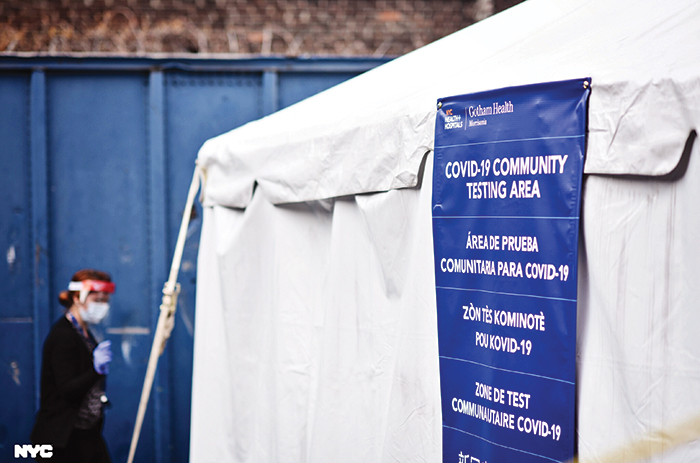Photo Courtesy of Michael Appleton/Mayoral Photography Office
“There is no time to waste, and widespread and affordable access to rapid tests will be an integral part of our country’s public health response to the Omicron variant and through the duration of the pandemic,” the lawmakers wrote in the letter.
By Forum Staff
More than 40 members of the House and Senate in sending a letter to President Joe Biden on Sunday, calling on his administration to build on its current efforts to expand access to COVID-19 testing by substantially increasing the supply of rapid tests and removing financial and logistical barriers to access for the duration of the pandemic, Rep. Grace Meng (D-Flushing), one of the missive’s signatories, announced Monday.
These measures would ensure the United States is mobilizing a more comprehensive public health response as the country enters a new phase of the pandemic, and that rapid testing—one of the most effective tools the federal government has at its disposal—is free, accessible, and convenient for all.
“The rapid spread of the Omicron variant over the past weeks suggests that Americans are in a dramatically more vulnerable position than we had anticipated being just last month. There is no time to waste, and widespread and affordable access to rapid tests will be an integral part of our country’s public health response to the Omicron variant and through the duration of the pandemic,” the lawmakers wrote in the letter.
Last month, the Biden administration announced plans to purchase 500 million antigen, or “rapid” COVID-19 tests, and develop a system to distribute them nationwide at no cost. However, the rapid transmission of the Omicron variant over the past several weeks and its increased ability to spread to fully-vaccinated individuals indicate far more testing capabilities are needed, and will be needed for the foreseeable future, as well as policies that ensure testing is easy, free, and accessible to everyone.
Specifically, the letter calls for the administration to:
- Manufacture enough tests that every American could take at least one rapid test per week. Many public health experts recommend regular surveillance testing—some as frequently as two times per week. If the U.S. were to adopt similar recommendations, it would need approximately 2.3 billion tests per month—several times the 500 million the administration has committed to purchasing and distributing for free.
- Ensure home test delivery is accessible to all. The administration announced plans to set up a website where individuals can order free COVID-19 rapid tests delivered to their homes. While this is a critical step, the administration should develop additional methods, such as a national hotline number, so those without reliable access to broadband internet can participate, the pols noted.
- Make regular testing more convenient by meeting individuals where they already are. To ensure individuals are testing regularly to keep themselves, their families, and their communities safe, the administration should work to make free rapid tests widely available in pharmacies, grocery stores, post offices local businesses, and other public locations that people frequent in their day-to-day lives.
- Make it easier for private health plan enrollees to be reimbursed for over-the-counter tests. While the administration’s new requirements that insurers reimburse individuals for at-home tests are critical, at-home kits cost approximately $14 to $34 and the reimbursement process can be time-consuming, which together may dissuade individuals or families who are struggling financially from purchasing these tests. The administration should take these hurdles into consideration as they draft their upcoming guidance.

